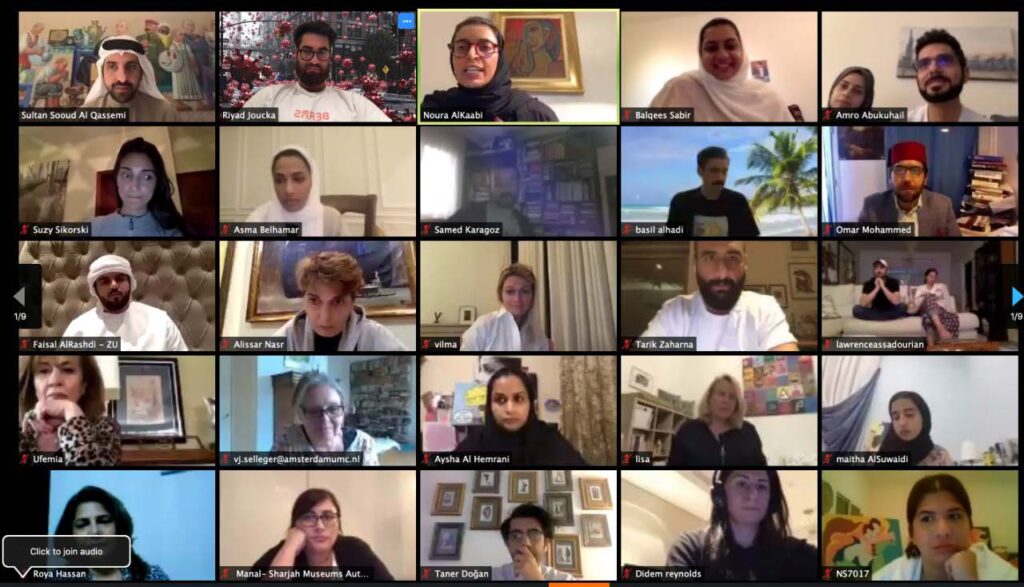INTERVIEW BY NADINE KHALIL
With the Canvas Summer 2020 edition emerging during the global pandemic, we look back to the pre-lockdown events as a bygone era and fast-forward to our present time of creative practices arising via virtuality and sociality, simulation and repetitive action, inside-out perspectives as well as hope as a practice. Navigating the new normal of our lives in confinement, we ask leading figures in the UAE about world-making and rebuilding culture. Curators tell us why art is so important at a time like this and artists reveal what the future will sound like in a seemingly posthumanist environment – from metronomic sewing machines to spaceship visions.
Columnist, commentator, academic, art collector and foundation head, Sultan Sooud Al Qassemi wears many hats. With deep research interests in Arab Modern art and architecture in the region, in 2019 he began a cultural majlis as a forum for conversation on context-specific social and political issues. We speak to the founder of Barjeel Art Foundation about the necessity of culture, survival and going online.

Nadine Khalil: The cultural majlis you have been hosting has grown from private weekly gatherings at your house to different initiatives in the US, linked to universities and enabling more public forms of participation. How do you see the format changing in the future? Sultan Sooud Al Qassemi: Firstly, I try to make each session as gender-balanced as possible. I see the majlis accommodating more individuals who live further afield, and those whom I wasn’t able to host physically. I’m thinking that perhaps in the future we will be able to incorporate a virtual reality element.
Sultan Sooud Al Qassemi: Firstly, I try to make each session as gender-balanced as possible. I see the majlis accommodating more individuals who live further afield, and those whom I wasn’t able to host physically. I’m thinking that perhaps in the future we will be able to incorporate a virtual reality element.
NK: In your first online version of the majlis, you mentioned that beautiful things come from solitude. What kind of hope can the arts offer during the current pandemic?
SSQ: We cannot imagine ourselves being locked up at home for weeks on end without access to books and images. There’s been a flourishing art scene online, such as Tasneem Alsultan’s live interview series on Instagram, which brings together fellow photographers and other cultural actors in the region. Other examples include galleries in Dubai and elsewhere placing previously inaccessible work online. We have even seen relatively unapproachable institutions humbly asking the community for recommendations in activating their spaces.
NK: What have the responses been like for you – especially given that the majlis was started to build exchange, community and discourse in a physical space?
SSQ: Despite having faced a number of technical difficulties in managing the room, slides and participants, I must also add that I’ve been overwhelmed by the positive response from all over the world. There are people in California waking up early and and others in Singapore sleeping late to catch the show. I have also started recording these sessions so that they are available for later viewing.
NK: Barjeel Art Foundation’s groundbreaking travelling exhibition, Taking Shape: Abstraction from the Arab World, 1950s–1980s, which began at Grey Art gallery in New York this year, mines key moments in Arab histories bringing to light in a living archive of art that was shaped by postcolonialism and radical movements. What are your plans for sharing the research behind the show now that we are under lockdown and the exhibition cannot travel?
SSQ: We have made the first introductory chapter available online in an overview of the entire exhibition as well as a number of artist spotlight posts. You can also now download the exhibition checklist and label text. In addition, all of the works are already on our website and we are also working on a project to document regional histories at Barjeel.
NK: We may not need art to survive, but why is culture important at a time like this?
SSQ: Culture is important because it encompasses different forms of intellectual production. It enables us to continue a semblance of normalcy during such difficult periods, as we are facing now.
This article was originally published in Canvas Summer 2020 Issue. The PDF can be downloaded here.